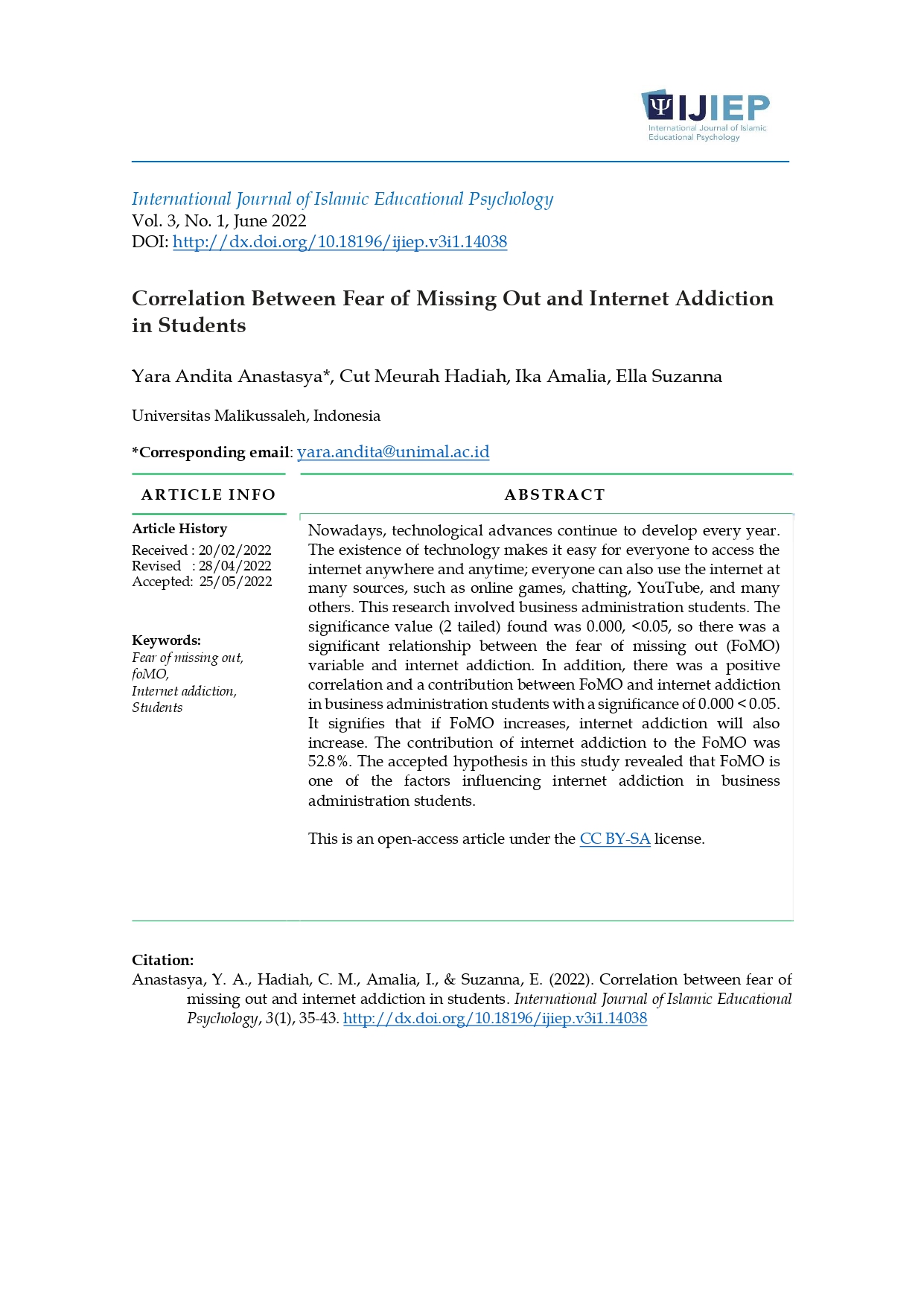Correlation Between Fear of Missing Out and Internet Addiction in Students
DOI:
https://doi.org/10.18196/ijiep.v3i1.14038Keywords:
fear of missing out, foMO, internet addiction, studentsAbstract
Nowadays, technological advances continue to develop every year. The existence of technology makes it easy for everyone to access the internet anywhere and anytime; everyone can also use the internet at many sources, such as online games, chatting, YouTube, and many others. This research involved business administration students. The significance value (2 tailed) found was 0.000, <0.05, so there was a significant relationship between the fear of missing out (FoMO) variable and internet addiction. In addition, there was a positive correlation and a contribution between FoMO and internet addiction in business administration students with a significance of 0.000 < 0.05. It signifies that if FoMO increases, internet addiction will also increase. The contribution of internet addiction to the FoMO was 52.8%. The accepted hypothesis in this study revealed that FoMO is one of the factors influencing internet addiction in business administration students.References
Arnett, J. J. (2013). The evidence for generation we and against generation me. Emerging Adulthood, 1(1), 5–10. https://doi.org/10.1177/2167696812466842
Brown, V. R., & Vaughn, E. D. (2011). The writing on the (Facebook) wall: The use of social networking sites in hiring decisions. Journal of Business and Psychology, 26(2), 219–225. https://doi.org/10.1007/s10869-011-9221-x
Burke, M., Marlow, C., & Lento, T. (2010). Social network activity and social well-being. Conference on Human Factors in Computing Systems-Proceedings. https://doi.org/10.1145/1753326.1753613
Deci, E. L., & Ryan, R. M. (2001). Handbook of self-determination research. The University of Rochester Press. National Institute of Education Library, Singapore
Dossey, L. (2014). FoMO, digital dementia, and our comparisons on managerial career satisfaction and turnover intentions. Emerald Insight, 14 (1), 87-110. https://doi.org/10/1016/j.explore.2013.12.008
Eddleston, K. A. (2009). The effects of social comparisons on managerial career satisfaction and turnover intentions. The Career Development International, 14(1), 87–110. https://doi.org/10.1108/13620430910933592
Elhai, J. D., Levine, J. C., Dvorak, R. D., & Hall, B. J. (2016). Fear of missing out, need for touch, anxiety and depression are related to problematic smartphone use. Computers in Human Behavior, 63, 509-516 https://doi.org/10.1016/j.chb.2016.05.079
Gezgin, D. M., Hamutoglu, N. B., Gemikonakli, O., & Raman, I. (2017). Social network users: Fear of missing out in preservice teachers. Journal of Education and Practice, 8 (17), 156-168
Hato, B. (2013). Compulsive mobile phone checking behavior out of a FoMO: development, psychometric properties and test-retest reliability of a C-FoMO-Scale. [Master thesis, Tilburg University]. Netherlands.
Hetz, P. R., Dawson, C. L., & Cullen, T. A. (2015). Social media use and the fear of missing out (FoMO) while studying abroad. Journal of Research on Technology in Education, 47 (4), 259–272. https://doi.org/10.1080/15391523.2015.1080585
Jood, T. E. (2017). Missing the present for the unknown: the relationship between fear of missing out (FoMO) and life satisfaction. [Doctoral thesis, University of South Africa]. South Africa.
JWT Intelligence. (2012). Fear of missing out (FOMO). Retrived from https://www.jwtintelligence.com/production/FOMO_JWT_TrendRepo rt_May2011.pdf.
Kross, E., Verduyn, P., Demiralp, E., Park, J., Lee, DS., Lin, N., Shablack, H., Jonides, J., & Ybarra, O. (2013) Facebook use predicts declines in subjective well-being in young adults. PLoS ONE, 8(8): e69841. https://doi.org/10.1371/journal.pone.0069841
Li, X. & Chen, W. (2014). Facebook or Renren? A comparative study of social networking site use and social capital among Chinese international students in the United States. Computers in Human Behavior, 35, 116-123 http://dx.doi.org/10.1016/j.chb.2014.02.012
Marlina, R. D. (2017). Hubungan antara fear of missing out (Fomo) dengan kecenderungan kecanduan internet pada emerging adulthood. Journal. Unpublished. Universitas Mercu Buana. Yogyakarta.
Ormrod, J. E. (2012). Human learning (6th ed). United States: Pearson Education
Przybylski, A. K., Murayama, K., DeHaan, C. R., & Gladwell, V. (2013). Motivational, emotional, and behavioral correlates of fear of missing out. Computers in Human Behavior, 29(4), 1841–1848. https://doi.org/10.1016/j.chb.2013.02.014
Pusat Kajian Komunikasi Universitas Indonesia. (2015). Hasil survei: “Pengguna internet di Indonesia” oleh APJII bekerja sama dengan Pusat Kajian Komunikasi Universitas Indonesia. PUSKASKOM. Retrived from http://puskakom.ui.ac.id/publikasi/rilis-pers-hasil-survey-profil- pengguna-internet-di-indonesia-2014-oleh-apjii-bekerja-sama-denganpusat-kajiankomunikasi- universitas-indonesia.html
Samaha, M. & Hawi, N. S. (2016). Relationships among smartphone addiction, stress, academic performance, and satisfaction with life. Computer in Human Behavior, 57, 321–325. https://doi.org/10.1016/j.chb.2015.12.045
Saputra, A. (2019). Survei penggunaan media sosial di kalangan mahasiswa kota padang menggunakan teori uses and gratifications. Jurnal Dokumentasi dan Informasi, 40(2), 207-216 https://doi.org/10.14203/j.baca.v40i2.476
Santrock, J. W. (2012). Adolescence: perkembangan remaja (6th ed). Jakarta: Erlangga.
Sayrs, E. (2013). The Effects of Smartphone Use on Cognitive and Social Functions. (Undergraduate thesis, University of Colorado). Unitet States.
Triani, C. A. (2017). Hubungan antara kebutuhan berelasi dan fear of missing out pada pengguna media sosial dengan harga diri sebagai moderator. [Master thesis, Universitas Gadjah Mada]. Indonesia.
Van den Eijnden, R. J., Meerkerk, G.J., Vermulst, A., Spijkerman, R., & Engels, R. (2008). Online communication, compulsive Internet use, and psychosocial well-being among adolescents: a longitudinal study. Developmental Psychology, 44 (3), 655-665 https://doi.org/10.1037/0012-1649.44.3.655
Wallace, P. (2014). Internet addiction disorder and youth. EMBO Reports, 15(1), 12-16 https://doi.org/10.1002/embr.201338222
Young, K, S. (2010). Internet addiction: a handbook and guide to evaluation and treatment. Canada: John Wiley & Sons, Inc.

Downloads
Published
How to Cite
Issue
Section
License

- Share — copy and redistribute the material in any medium or format
- Adapt—remix, transform, and build upon the material for any purpose, even commercially.
The licensor cannot revoke these freedoms as long as you follow the license terms. Under the following terms:
- Attribution: You must give appropriate credit, provide a link to the license, and indicate if changes were made. You may do so in any reasonable manner, but not in any way that suggests the licensor endorses you or your use.
- ShareAlike: If you remix, transform, or build upon the material, you must distribute your contributions under the same license as the original.
- No additional restrictions — You may not apply legal terms or technological measures that legally restrict others from doing anything the license permits.






